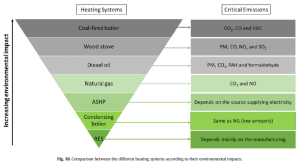No. Producing and burning any sort of fuel has an environmental impact. Burning disrupts local wildlife and water, causes soil erosion, and creates harmful air pollution.
Wood is wrongly considered by some to be an environmentally friendly fuel or carbon neutral.
Wood as a fuel has a large environmental footprint and is a major source of particulate matter pollution in urban environments.
It takes years for the carbon dioxide created by wood burning to be reabsorbed. Significant and harmful emissions are also produced during the production, transportation and manufacturing of wood fuels.
Small, and especially older, domestic wood-burning appliances are a large source of other harmful pollutants, such as particulate matter and black carbon.
A review of heating systems found that after coal-fired boilers, wood burning stoves have the second highest negative environmental impact.

(taken from Mahmoud et al., 2021)
